|
|
|
Sort Order |
|
|
|
Items / Page
|
|
|
|
|
|
|
| Srl | Item |
| 1 |
ID:
153355
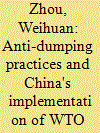

|
|
|
|
|
| Summary/Abstract |
We explore China's behaviour in taking anti-dumping actions, with a focus on those which have been challenged under the WTO dispute settlement mechanism. We argue that the typical motivations behind China's resort to anti-dumping measures include protection, retaliation, industrial development and export promotion. These motivations are likely to carry more weight than China's observance of WTO obligations when deciding whether to impose anti-dumping measures and whether to implement WTO rulings. Brief recommendations are provided to foreign governments and exporters on how to avoid China's anti-dumping actions.
|
|
|
|
|
|
|
|
|
|
|
|
|
|
|
|
| 2 |
ID:
082367
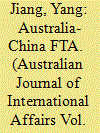

|
|
|
|
|
| Publication |
2008.
|
| Summary/Abstract |
This article seeks to explain why the Free Trade Agreement negotiation between Australia and China has been extremely difficult, despite political goodwill from Beijing and Canberra. It first argues that the reason for the slow progress of the negotiation is not caused by lack of motivation from the Chinese government. It then lists the differences in negotiation between China and Australia, focusing on their respective selective vs. comprehensive, border vs. behind-the-border, flexible vs. rigid and state vs. market approaches. It then looks into domestic politics in China to explain why China has taken such a stance, underlining domestic resistance from sectors like agriculture and services in a dynamic domestic political environment on the one hand, and the structure of the policymaking institution that constrains the power of trade negotiators on the other. It concludes by pointing out where the potential for a breakthrough in the FTA negotiation lies.
|
|
|
|
|
|
|
|
|
|
|
|
|
|
|
|
| 3 |
ID:
079465
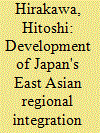

|
|
|
| 4 |
ID:
086406
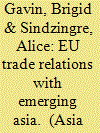

|
|
|
|
|
| Publication |
2009.
|
| Summary/Abstract |
Trade interdependence between Europe and Asia has rapidly increased in recent years. Europe-Asia trade flows now constitute a 'third link' in the global economy. As trade expands, however, global trade governance has declined and free trade agreements (FTAs) have increased. Hence, the Global Europe strategy has been designed to enhance trade relations with emerging Asia which is the most dynamic region in the global economy today. But Asia's model of export led growth leaves it more exposed to shocks emanating from outside the region than ever before raising questions about its sustainability. Deep integration agreements between Europe and Asia are needed to foster economic growth. They also need a development dimension to help Asian countries address their key development challenges.
Brigid Gavin was the Research Coordinator of the workshop on 'Deep Integration and North-South Free Trade Agreements: EU Strategy for a Global Economy' which provided the papers and discussion forum for the articles in this special edition. The workshop took place at the United Nations University-Comparative Regional Integration Studies (UNU-CRIS) centre in Bruges, Belgium on 19-20 June, 2008. She wishes to express her thanks to Mr Luk Van Langenhove, Director of UNU-CRIS for financial support and to all the authors and participants in the workshop for their contribution to making this project a real success. A special word of thanks goes to Lars Nilsson, Chief Economist Unit, DG Trade, European Commission for his opening presentation to the workshop.
Alice Sindzingre is Research Fellow, National Centre for Scientific Research (CNRS), University of Paris and Visiting Lecturer at School of Oriental and African Studies (SOAS), University of London. This analysis draws from her paper 'The EU Economic Partnership Agreements with Africa' which she presented at the workshop and available on the UNU-CRIS website.
|
|
|
|
|
|
|
|
|
|
|
|
|
|
|
|
| 5 |
ID:
082366
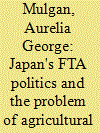

|
|
|
|
|
| Publication |
2008.
|
| Summary/Abstract |
Japan's willingness to negotiate Free Trade Agreements (FTAs) is not matched by a readiness to liberalise agricultural trade. Japan has used a variety of mechanisms to limit the extent of agricultural concessions in FTAs. Public choice theory predicts that FTAs are a more effective instrument for opening Japan's agricultural market than the WTO because they reshape the domestic politics of Japanese trade in ways that are conducive to further market opening. FTAs do this by altering the domestic politics of trade policymaking on the demand side as well as some aspects of the supply side. On the demand side, business groups mobilise even more strongly to demand an end to agricultural protection, whilst on the supply side, the value of FTAs for broader state interests are recognised by politician-leaders. Various structural obstacles in the policymaking process, however, prevent the altered demand and supply-side dynamics from necessarily delivering free trade outcomes.
|
|
|
|
|
|
|
|
|
|
|
|
|
|
|
|
| 6 |
ID:
149055
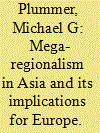

|
|
|
|
|
| Summary/Abstract |
The rise of mega-regionalism in the Asia-Pacific has become a significant development for the region itself as well as the global trading system. Europe, in particular, has a great deal at stake in this process. This paper considers the economic costs of EU exclusion from Asia-Pacific economic cooperation initiatives.
|
|
|
|
|
|
|
|
|
|
|
|
|
|
|
|
| 7 |
ID:
192537
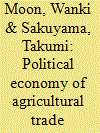

|
|
|
|
|
| Summary/Abstract |
This paper contrasts agricultural protection of Japan and Korea with the West and identifies major differences between them. It characterizes agricultural protection of Japan and Korea (net heavy food importers) as “tariff-based and scarcity-sensitive” aimed at promoting survival and the West (net food exporters) as “subsidy-based and surplus-inducing” aimed at enhancing farm income. We then identify factors underlying the coevolution and divergence in the extent of agricultural trade liberalization between Japan and Korea since the launch of the Uruguay Round in 1986. Korea accepted deep cuts in agricultural tariffs in bilateral FTAs with the US and EU during the 2000s while Japan continued to protect farm interests by concluding low levels of FTAs with politically sensitive products excluded from tariff concessions. The two countries’ stances reversed since 2013 with Japan becoming proactive in pursuing high levels of FTAs with major agricultural exporting countries and Korea decelerating its opening of agricultural markets. To explain such divergences, this paper develops a political economy framework in which the incumbent political leadership would consider both national interests and sectoral (farm as import competing industries and business/manufacturing as exporting industries) special interests. Our analysis shows that President Roh (2002–2007)’s embracing of neoliberal paradigm in formulating foreign trade policies that would promote national interests underlies the unprecedented level of agricultural trade liberalization in Korea during the 2000s, while Prime Minister Shinzo Abe’s determination not to be outcompeted by the rising China and Korea’s ambitious FTA strategies underlies Japan’s proactive bilateral and mega-FTA drives since 2013.
|
|
|
|
|
|
|
|
|
|
|
|
|
|
|
|
| 8 |
ID:
083128
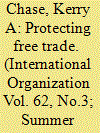

|
|
|
|
|
| Publication |
2008.
|
| Summary/Abstract |
The design of rules of origin in free trade agreements (FTAs) arouses spirited lobbying campaigns that mostly escape public attention. This article argues that the domestic groups generally most favorable to FTAs differ in their preferences over rules of origin: industries with large returns to scale favor strict rules of origin to gain scale economies in an FTA, while industries with multinational supply chains prefer lenient rules of origin to accommodate offshore procurement. An econometric analysis of rules of origin in the North American Free Trade Agreement (NAFTA) finds tougher rules of origin the higher the external trade protection and the larger the returns to scale, and more permissive rules of origin the greater the involvement in foreign sourcing. The results suggest that rules of origin may be critical to building domestic coalitions for FTAs. Industry preferences toward rules of origin therefore have important implications for the politics of FTA ratification
|
|
|
|
|
|
|
|
|
|
|
|
|
|
|
|
| 9 |
ID:
146407
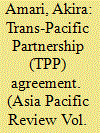

|
|
|
|
|
| Summary/Abstract |
On October 5, 2015, the 12 countries reached an agreement in principle on the Trans-Pacific Partnership (TPP) that will build 21st-century trade and investment rules concerning tariffs, services, investment, intellectual property, state-owned enterprises, and other areas. Going beyond the myriad bilateral FTAs and EPAs, the TPP is intended to give shape to policy relating to trade in the Asia-Pacific. Since Japan officially participated in TPP negotiations in 2013, one focus has been on an economic growth strategy that provides opportunities for small- and medium-sized enterprises to consider overseas expansion and that allows Japan to re-emerge as a major exporting country. Regionally, the TPP is expected to contribute to economic development in the Asia-Pacific as a whole at the dawn of an “Asia-Pacific Century.” As the minister in charge of negotiating for Japan's national interest in the TPP, the author shares his perspective about the agreement.
|
|
|
|
|
|
|
|
|
|
|
|
|
|
|
|
|
|
|
|
|